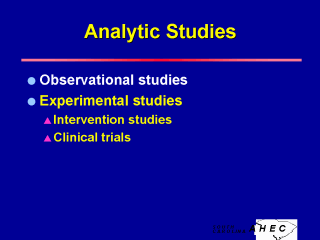| front |1 |2 |3 |4 |5 |6 |7 |8 |9 |10 |11 |12 |13 |14 |15 |16 |17 |18 |19 |20 |21 |22 |23 |24 |25 |review |
 |
Experimental studies generally provide the strongest evidence that a given response is the cause of a disease or that a specific intervention is effective. The controlled clinical trial, the “gold standard” of studies of efficacy of disease interventions or prevention methods, is conducted by identifying an eligible population, dividing it into control and test groups (usually randomly), applying the intervention, and watching to see what the effect is compared to the control group. Experimental studies typically are expensive and challenging to conduct. The methodology for these studies is extensively described in a variety of resources, and is not a major focus of this module. |